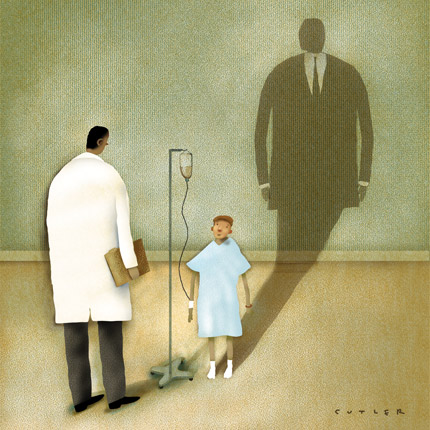EHRs could solve resource overuse, free up physician time
Electronic health records can help physicians with the administrative burdens of practice, allowing them to focus on the clinical aspects of caring for patients.
My father died in 1976 of pancreatic cancer. We did not have the imaging modalities now available and had to watch his condition deteriorate slowly over time to fully understand the course of his illness. While in his case the overall outcome might have been the same, these advances for others have truly been lifesaving. I want for my patients what I wanted for my father—care that improves outcomes.
Today, we need innovative solutions to the mounting costs and overuse of imaging. We certainly don't want to deny our patients proper care, but we don't want to waste valuable resources on unneeded scans. We must be able to explain when less medical testing and treatment is best. We don't need to expose patients to the cost, radiation and worry caused by incidental findings we have to chase from tests that likely weren't necessary in the first place.
On the other hand, when expensive technology or medication is needed and is the standard of care, we should not waste valuable physician time by traveling circuitous routes for approval. My personal experience is that calling an 800 number and talking to a series of non-physicians is not a particularly effective way to weed out unneeded tests and fast-track the needed ones. It takes away valuable time that could be spent with patients.
At ACP, we are embarking on our high-value, cost-conscious care initiative. The ultimate goal is to “bend the cost curve” by minimizing or eliminating overused or misused care that is contributing to health care costs without benefiting our patients. We will do this through clinical recommendations and by educating physicians and patients. The vehicles for communicating and disseminating this information will include Annals of Internal Medicine, MKSAP, and educational meetings and conferences.
Health Affairs (2009;28:w533-543) has estimated that it costs each U.S. primary care physician about $65,000 per year to deal with non-claim-related administrative hassles. We need to put that time and those resources to better use.
In my alternate universe I would offer a Nobel Prize for efficiency to the person or persons who develop software that:
- 1. can be built into electronic health records (EHRs) or made available through the Web.
- 2. allows one to enter name, date of birth, and insurance number from a card that identifies plan benefits and requirements for prior approval, formularies, etc., with a link to use these when appropriate. An EHR would propagate much of this information and make the process of finding formularies and investigating and/or obtaining prior approval less painful.
- 3. allows physicians to see the available on-formulary drugs, as well as the cost of each drug to each patient. The prior authorization process would be initiated from the site with the necessary patient information prepopulated, avoiding the 29 minutes of what I call “getting the keys to the magic kingdom” and going straight to the one minute or less of clinical info that almost always suffices on the first try.
- 4. provides a similar direct link to any needed prior authorization process for imaging, perhaps with a drop-down menu that allows the 98% of studies that will ultimately be approved to sail through, and also provides an educational rationale with links to articles or guidelines for the 2% that are ultimately not approved.
ACP is actively involved in a variety of administrative simplification efforts. An ACP-supported Council for Affordable Quality Healthcare (CAQH) project has established a database of physician-provided information that is accessed by all major payers for credentialing purposes and has received near universal uptake by physicians. ACP has worked with America's Health Insurance Plans (AHIP) in a portal effort in New Jersey and Ohio. We are already working with many others to achieve common goals. The ACP Medical Services Committee will devote significant time at its October 2010 face-to-face meeting to understanding the landscape and better meeting the needs of our members.
I plan to use my bully pulpit as ACP president (and it can be a great platform) to cajole and move us toward a more perfect interface that allows us more time to care for patients. If any of you talented ACP members have ideas and/or existing resources that may help us toward this end for everyone, please let me know.




